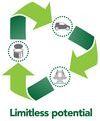
- About 80% of all the known chemical elements in the world are categorised as metals. Metal comes from the Earth. Let’s try and keep it there.
- Metal is 100% recyclable. It is permanent, and it can be recycled forever, over and over again. It contributes to the Circular Economy, avoiding landfill, as well as saving the destruction of natural habitats caused by the mining of metal ore.
- Recycling one tonne of steel can save one and half tonnes of iron ore from being mined. Iron is a metal, but steel is a man-made alloy. Steel is made by mixing iron and carbon together.
- Waste Electrical and Electronic Equipment (known as WEEE) generally covers products that have a plug or need a battery, such as fridges, vacuum cleaners, and computer equipment. As funny as that acronym is, it is important WEEE is recycled correctly. Not only does WEEE contain metal, but it can also contain lithium and lithium-ion batteries that are incredibly dangerous. If they are damaged, the batteries can cause fires.
- The metal in your mobile phone could be recycled into an Olympic medal. Tokyo's Olympic medals were made from 78,985 tons of recycled electronic devices, including mobile phones. It can contain gold, lithium, aluminium, cobalt, copper, lead, nickel, silver, and zinc. One tonne of smartphones can contain 300 times more gold than one tonne of gold ore.
- You can get paid for your scrap metal. Ensuring you have the appropriate identification, you can go to a metal recycler and be paid by BACS, cheque or eTransfer. Cash for your scrap is illegal, however, so do report it if you are offered it.
- Recycling steel uses 70% less energy than mining and refining ore. Steel is the most widely used metal. It is easily identifiable as it is magnetic and can be easily separated from general waste. It is used to make many different items including cars, bridges, and playpark equipment.
- Recycling metal avoids sending a permanent material to landfill. There is a process called urban mining, whereby materials like metal and WEEE previously discarded in general waste, can be reclaimed from the ground. While this ensures even more metal can be recycled, it is easier. cheaper and safer to recycle it correctly first time.
- Recycling metal emits 80% less CO2 than production from raw materials. It is credentials like this that make metals recycling a key driver in the Government achieving its net zero targets.
- An aluminium drinks can can be back on the shelf of a supermarket as a new drinks can, 60 days after it was originally bought. Aluminium can also be used for aeroplane parts, a beer keg or foil for your lunchtime sandwich.

Because metal can be recycled time and time again, it has limitless potential. Let the BMRA know what you want your metal to be in its next life on social media #metalgoals. Learn more.
